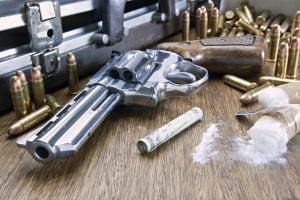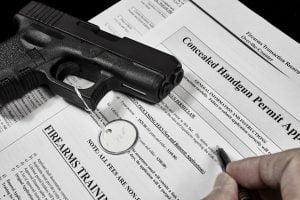
Federal Firearms Enhancements
I. Generally Title 18 of the United States Code is where federal firearm laws are found, including violations of possession
John Teakell is a seasoned defense attorney who navigates firearms legislation with expertise. At Teakell Law, clients find professional legal advice, support, and unparalleled expertise in the field of firearms law. Through a combination of strategic legal planning, meticulous case analysis, and aggressive advocacy, John Teakell has established himself as a leading defender in the realm of gun violations, offering hope and guidance to individuals facing firearm and gun violation charges.
The Texas Penal Code defines firearms as devices designed to launch a projectile using explosive force. This definition is quite broad and includes various types of weapons. For example, it covers not only traditional handguns and rifles but also shotguns, certain types of antique firearms, and even some improvised devices like homemade guns. This wide-ranging definition ensures that the law can apply to many different forms of weaponry that operate on this basic principle of using explosive force to fire a projectile.
In Texas, the laws governing the ownership of firearms and the requirements for carrying them concealed are distinct but interconnected, emphasizing the need for lawful handling and usage.
Owning a Firearm: Generally, Texas law allows individuals to own firearms without requiring a specific license for mere possession in their homes or places of business.
Concealed Carry: Carrying a concealed firearm in Texas requires a License to Carry (LTC). To obtain an LTC, applicants must meet several criteria, including completing a training course, passing a background check, and meeting age and eligibility requirements.
Illegal Possession: It’s illegal to possess a firearm under certain conditions, such as if a person has been convicted of a felony or domestic violence misdemeanor, or is subject to a restraining order for family violence.

I. Generally Title 18 of the United States Code is where federal firearm laws are found, including violations of possession

Generally Drug trafficking or drug activities are often prosecuted in federal court, especially if the activities are on a larger

Generally “Felon in Possession of a Firearm” is very often used when someone with a felony conviction simply possesses a firearm.

Generally A person has to obtain a license as a federal firearms dealer if he/she is engaged in the business
Federal prosecutions of gun violations encompass a wide array of charges, from falsifying information to obtain firearms to engaging in unauthorized selling or manufacturing. The severity of these offenses highlights the federal government’s rigorous enforcement of firearms regulations.
Beyond the well-known charges lie less frequent but equally grave violations such as illegal possession of automatic weapons, strawman purchases, and obliteration of serial numbers. These offenses illustrate the depth of legal restrictions surrounding firearm ownership and the critical need for adherence.
The process of purchasing a firearm is laden with legal obligations, including the accurate disclosure of one’s criminal history. Violations often lead to legal actions including forfeiture, where firearms and related assets can be confiscated by the government. Non-compliance is a serious offense, and the consequences reflect the serious nature of the crime.
Ammunition: Large quantities of ammunition or specialized types that were involved in the transaction.
Accessories: This could include items such as scopes, holsters, and magazines.
Financial assets: Money used in or gained from illegal transactions might also be seized.
Teakell Law excels in developing defense strategies that are comprehensive and customized for your specific case. His legal acumen allows him to effectively challenge prosecutorial evidence, negotiate with tenacity, and present a compelling defense in court.
In facing gun charges, the selection of a knowledgeable and experienced attorney is crucial. Teakell Law’s unparalleled expertise in firearm laws and his commitment to his clients’ defense make him an essential ally in navigating the complexities of gun violation charges.
Gun violations present a complex legal challenge that requires nuanced understanding and strategic defense. Contact us today. With Teakell Law’s guidance, individuals facing such charges can navigate the intricate legal landscape with confidence, backed by expert representation that aims for the most favorable outcomes. His dedication to defending the rights of his clients in gun-related cases reflects his commitment to justice and legal excellence.
Copyright © 2024 The Law Office of John R. Teakell – All Rights Reserved. Disclaimer | Privacy Policy
Based in Dallas, Texas, our law firm serves clients in Dallas County, Collin County and the surrounding areas. | Powered by Rise Local